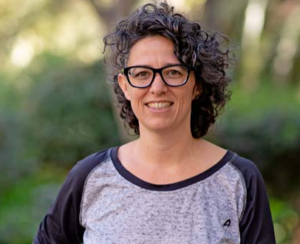
Flora Partenio is a lesbian and feminist, and a member of Development Alternatives with Women for a New Era (DAWN), member of the Feminist Forum against the World Trade Organization and against the G20, and an activist of the Green Tide in Argentina. She is a sociologist and University lecturer at the University Arturo Jauretche of Buenos Aires (Argentina).
She says that a transformative economy must be “non conventional, one that questions xenophobia, racism, patriarchy and the hierarchies typical of capitalism. An economy will never be transformative if not feminist.”
– You come from Buenos Aires…
– Yes, there we organized a week of global action against the G20 and a School of Feminist Economics. We thought it was important to participate in this process in Barcelona, leading up to 2020. It is critical to have discussions about transforming economies and feminism with others. Life must be in the centre and feminism can articulate movements of agroecology, the social economy and the commons.
The World Social Forum of Transformative Economies (WSFTE) 2020 must address the importance of feminisms. When we discuss agroecology, we must recognize the importance of feminist pedagogies and practices. We must emphasize that women, lesbians and trans are the ones who suffer the effects of sistemic crisises. Feminism is the movement that is providing more answers to the right to politics, to fascism, to debt crises… Latin America has returned to the International Monetary Fund and back to austerity policies. We have to articulate the struggles of the feminists that are on the streets with the experiences of the WSFTE.
– How can we reflect these global discussions at a local level?
– The Forum works to achieve a uniform statement working both at the local and global level, but the challenge will be how to collaborate with others within our countries. We will have to activate local networks, encourage regional platforms and link transformative economies with the resistance that already exists in Latin America. We must also be thinking about the economy of migrants and about commercial policy.
– What do we have to change?
– We cannot ask ourselves about the sustainability of life and work towards 2020, if we do not start discussions about care, practices and the organisations that foster reproduction of capitalist and patriarchal norms. There is a gender divide of labour which was common to all our experiences. In order to change the economy, we have to change our practices, structures and hierarchies looking through a feminist lens.
– We should fight against these practices from within the organisations as well as from outside, shouldn’t we?
– There are two parallel struggles going on at the same time. Patriarchal and sexist practices are within our organizations. We have to provide an alternative strategy for organizations to think about the place of the LGBT community within these economies, who are in the political reference sites, who speaks for others and also who is in charge of logistical and technical aspects. After addressing these issues, it is clear that there is a gender based division of labour. Therefore, this will have to work hand in hand along with the fight against capital. A transformative economy must be anti-capitalist, anti-racist and anti-patriarchal.
– What are our short-term expectations?
– To have been able to recover the altermundista and anti-capitalist proposal has been a great achievement with forty-eight countries being a part of this process. There was a unified effort coming into the Barcelona meeting, with feminists promoting the event by inviting feminists from all over the world. The diversity of experiences shows us that the resistance is very active globally and that right and neoliberalism is still strong. We must be aware of the fact that in Latin America there is now an increase in the violation of human rights and demonstrators are now being seen as criminals, so we must continue to fight against this oppression.
Interview first published by the newspaper “La Directa” (Spain) on April 2019, page 3. English translation made by DAWN.
